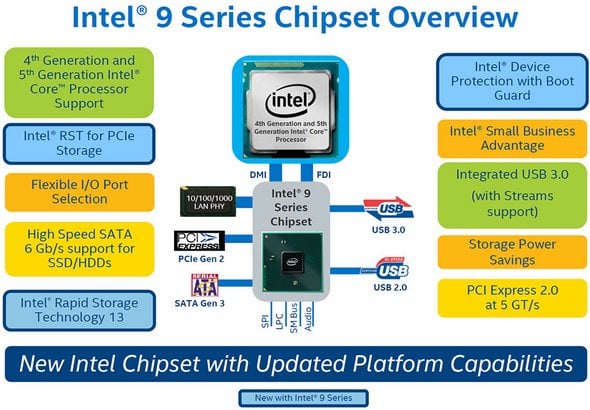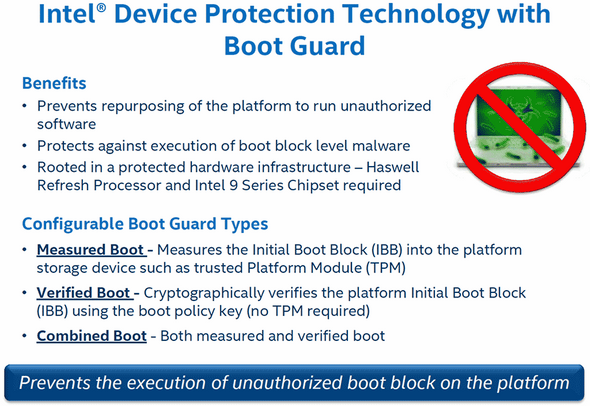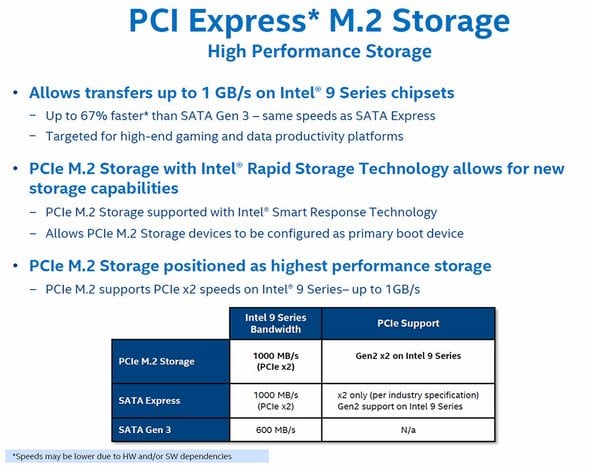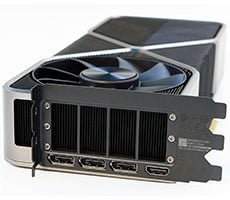Z97 Motherboard Round Up: EVGA, MSI, Gigabyte
Introducing the Intel Z97 Chipset
Although Intel isn’t quite ready to take the wraps off of its updated Haswell-based processors (codenamed Devil’s Canyon) or its next-gen Broadwell-based processors, the company is at the ready with a brand new chipset that ups the ante in terms of features and overall performance. Intel’s 9-series chipset isn’t quite as extensive as previous families (there are just two options at this time), but the new capabilities it brings to the table will be welcomed by everyone from hardcore overclockers to IT types and business users.
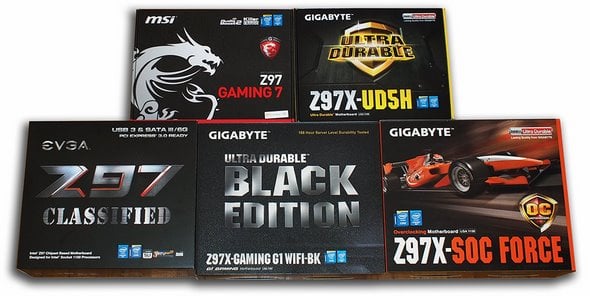
Z97 Based Motherboard From Gigabyte, EVGA, and MSI
We tested a quintet of Z97 based motherboards from MSI, EVGA, and Gigabyte, using Intel’s current flagship Haswell-based processor, the Core i7-4770K. The Z97 Express chipset was designed to be a modern companion to Intel’s high-end Haswell-based desktop processors, that adds more high speed SATA ports and M.2 / SATA Express SSD support, but it is also ready for next-gen Broadwell-based processors, which we should be hearing about shortly.
There is another 9-series chipset planned as well, namely the H97. The main differences between the two 9-series chipsets lie in their support for things like overclocking, Intel Smart Response Technology, and vPro management-related features, though we’ll step through specifics in more detail in just a bit.
The high-level block diagram above gives a good visual representation of the Z97 chipset’s main features. Like the previous-gen Z87 (and a few generations that came before it), the new Z97 is essentially an I/O hub, as all of the traditional Northbridge functionality previously found in a separate Northbridge chip has been integrated into the processor itself.
Intel’s socket 1150 Core processors offer 16 lanes of PCI Express 3.0 connectivity on-die, which can be configured in a number of different ways on the Z97 (i.e. 1x16, 2x8, etc.) and they feature integrated dual-channel, DDR3 memory controllers with maximum officially supported speeds of up to 1600MHz (much higher speeds are possible with overclocking, however).
The processors are linked to the chipset via Intel’s FDI (Flexible Display Interface) and a 20Gb/s DMI 2.0 interface. The chipset itself is outfitted with 8 more PCIe 2.0 lanes, along with various other I/O, like six SATA ports and an integrated Gigabit MAC. You’ll also find native USB 3.0 support, with up to six USB 3.0 and eight USB 2.0 ports built in. The chipset has support for Intel’s Rapid Storage Technology (RST) as well, along with RAID, Smart Response Technology, or SRT, and other features like FastBoot and HD Audio. New to the 9-series chipsets is support for M.2 solid state drives and SATA Express.
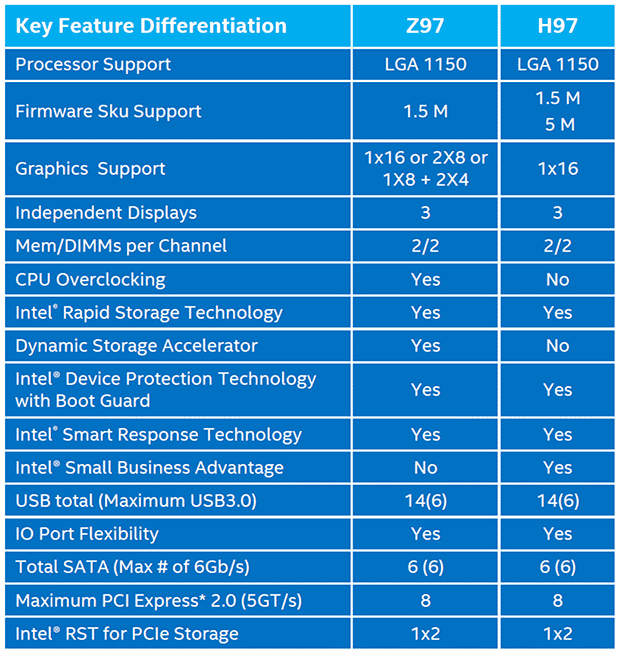
Intel Z97 vs. H97 Feature Comparison
The main differences between the new Z97 and H97 are broken down in the table above. The Z97 supports overclocking, dynamic storage accelerators, and flexible PCIe lane configurations, while the H97 supports Intel's Small Business Advantage technology, which is similar to vPro technology, but is targeted at unmanaged environments. Other than that, the two chipsets are virtually identical and sport the same number or ports, etc.
When Intel refreshes its Haswell processors (soon), the new 9-series chipsets will support something Intel calls Device Protection Technology with Boot Guard. These features are designed to prevent unauthorized tampering with the software on the system and protects the boot block from malware. Boot guard is configurable and can function with or without a Trusted Platform Module (TPM).
Perhaps the most exciting feature for enthusiasts or performance-conscious consumers coming with the 9-series chipsets is support for M.2 and/or SATA Express solid state storage. M.2 offers bandwidth of up to 1GB/s, up from the theoretical 600MB/s max of a SATA III port. M.2 SSDs will also be bootable on 9-series chipset or they can be configured to work with Intel's RST caching technology.

Though many of the features offered by Intel's storage drivers and software suite are supported with M.2 solid state drives, there is one major omission. RAID is not supported at this time with PCIe or NVMe SSDs. Let's look at some of the latest Z97 motherboards just launched to market...

